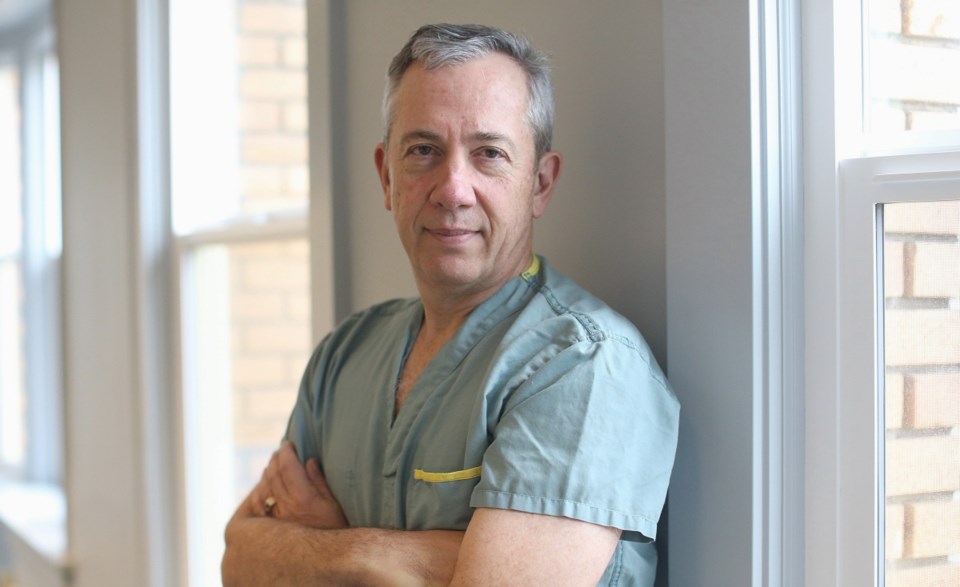This is one of a series of stories about the Victoria Hospitals Foundation’s You Are Vital campaign.
Dr. Paul Whelan, a urologist and executive medical director of the Island Health Surgical Program, has treated countless patients in a stellar career.
Becoming a patient himself isn’t something he was planning for.
“This [past] summer, I found out I had brain cancer and suddenly I was the one who needed care,” said Whelan, who is in his early 60s.
Until his diagnosis, he was exercising regularly and enjoying a healthy lifestyle.
“When you are active and healthy, you feel as though you could live forever,” Whelan said. “After I received news that two of my friends had cancer, I started training for a 100-kilometre bike race in their honour.”
He said he felt “strong and proud” after getting to 96 km one day during his August training.
“But the very next day, I collapsed on a golf course.”
He was taken to the emergency department at Royal Jubilee Hospital.
They quickly ruled out a cardiac problem, Whelan said. “But CT and MRI scans identified what looked like a tumour in my brain.
“They scheduled a brain biopsy.”
He said that Dr. Steve Hentschel, head of neurosurgery, was sensitive but direct in delivering the news to him.
“I was diagnosed with glioblastoma, a cancerous brain tumour that advances fast,” Whelan said. “Immediately, I knew the significance and gravity of what he was telling me.
“I have no doubt it was hard for Steve, too. Not only was I his boss, this would affect my life.”
It turned out that his collapse had nothing to do with the tumour and was triggered by something else. But if he hadn’t collapsed, the tumour wouldn’t have been found when it was, he said.
Whelan is relating his experience as a patient to bring attention to the Victoria Hospital Foundation’s You Are Vital campaign. The campaign goal is to raise $3.5 million by March to allow the foundation to buy more than 100 pieces of equipment for 11 hospital areas.
“Equipment alerts us to a problem that our care teams can remedy,” he said. “That is why I am so fortunate to work with the Victoria Hospitals Foundation to ensure we have the equipment our teams need to do their best work.
“I have supported the work of the foundation for many years and have been grateful to our community for their generosity to our hospitals.”
Whelan said his situation really brought the foundation’s work home.
“Now, especially, I am grateful to the donors who come together to support excellent health care on Vancouver Island.”
When assessing the possible treatments for his condition, Whelan knew he wanted the most aggressive approach — removal of the tumour. That would require a three-hour surgery.
“When I got into the operating room at Victoria General Hospital, everyone was so nervous,” he said. “There were nurses and doctors I work with every day, my colleagues.
“I wanted the team to be calm, I wanted to be calm and the only way we could find calm was through humour.”
Whelan said he was able to share a pre-surgery laugh with Hentschel, anesthesiologist Dr. Tom Ruta and the nurses.
“It was very strange to reverse the roles and be a patient in the operating room I work in every day.”
Hentschel called Whelan “an exceptional colleague” and said he is appreciative that neurosurgery has advanced the way it has over the past 20 years.
“Two decades ago, we would have had to operate blind and search for the tumour,” he said. “Nowadays, we can know precisely where it is, which is particularly helpful in cases like Paul’s, since his tumour wasn’t easy to access.
“We are grateful this technology allowed us to give him the best chance at recovery.”
Whelan said he was well aware of the risks posed by the surgery — brain fluid, infection, vision loss, stroke — but the operation went well. He was full of praise for Hentschel and Ruta.
“I am here today because of them, accurate diagnoses and skilled decision-making.”
Whelan said he is ready for the next step.
“Whether or not my health journey is over, that’s a story for my next MRI scan to tell,” he said. “For now, I am down to one job — getting better.”
Whelan said he is undergoing radiation and steroid treatment, and finds it frightening.
“Due to side-effects, I have short-term memory loss, and that makes you really humble because you realize how fragile life is. Cherish moments with loved ones and have these moments more often. Don’t wait for a medical emergency to realize what’s precious.”
He said he believes what happened to him came about for a reason.
“My story could be yours, and without extraordinary diagnostic and surgical equipment, I would not be here to tell it,” Whelan said.
“Funding advanced equipment for our hospitals will save lives. I know this because it is technology that lets my medical team know what is going on inside their patients right now. You are vital to ensuring our teams have access to this technology.
“Last summer, I thought I was training for a bike ride. I had no idea I was training for the ride of my life.”
The series
- Trip to doctor for 'cold' led to discovery of cancer in lung
- Putting moms and newborns first at Victoria General Hospital
- When the doctor becomes the patient
- Royal Jubilee lung tests prove a lifesaver for asthma sufferer
- Artist Robert Bateman takes hospital’s care to heart
- Heart attack a timely wake-up call



